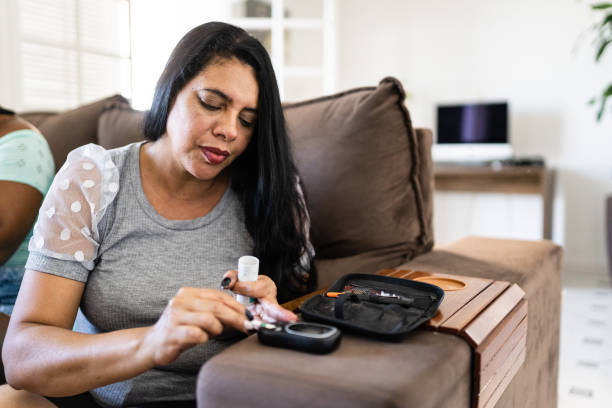Managing hypoglycemia with insulin is an important part of the diabetes care plan. Hypoglycemia is a condition that occurs when blood sugar levels drop too low, and it can cause serious health issues if not addressed.
Insulin is one of the primary treatments for this condition, as it helps to regulate blood sugar levels and prevent further complications. In this article, we’ll look at how to manage hypoglycemia with insulin, including tips for monitoring and adjusting your dosage.
What is Hypoglycemia?
Hypoglycemia is a medical condition that occurs when the sugar levels in your blood are too low. It’s usually caused by taking too much insulin or other diabetes medications, not eating enough food, exercising more than usual, or drinking alcohol. Symptoms of hypoglycemia can be mild to severe and include dizziness, sweating, shakiness, confusion, hunger, headache, blurred vision and fatigue. Hypoglycemia can lead to serious health problems if it’s not managed properly.
The best way to manage hypoglycemia is to monitor your blood sugar levels regularly and take steps to prevent them from dropping too low. This includes eating regular meals and snacks with carbohydrates and protein throughout the day as well as avoiding long periods without food or exercise. If your blood sugar levels drop too low, you should immediately consume foods or drinks with glucose such as juice or candy. If necessary, you should also take insulin injections to bring the levels back up again.
It’s important to recognize the signs of hypoglycemia so that you can take action quickly before it becomes a serious issue. With regular monitoring and preventive measures in place, managing hypoglycemia with insulin can help keep your blood sugar at healthy levels and help you stay healthy and active.
Symptoms Of Hypoglycemia
Symptoms of hypoglycemia can vary from person to person and range from mild to severe. Common symptoms include feeling tired, dizzy, weak, shaky, sweating, confusion, blurring of vision and hunger. In more severe cases, people may experience seizures and loss of consciousness. It is important to recognize these symptoms and take action quickly to avoid any serious health complications.

The most common symptom of hypoglycemia is a drop in blood sugar levels below 70 mg/dL. People who have diabetes may experience this as a warning sign before their blood sugar levels become dangerously low. Other signs that someone may be experiencing hypoglycemia include headaches, rapid heartbeat, nausea or vomiting and loss of appetite. Symptoms can also appear after eating sugary foods or drinking alcohol.
It is important to know the symptoms of hypoglycemia so that you can treat it quickly if needed. If you think you are experiencing hypoglycemia, contact your doctor immediately or seek medical help. Treatment usually involves eating a snack containing carbohydrates such as juice or candy followed by a meal with proteins and carbohydrates to raise your blood sugar level back up to normal levels. Insulin may also need to be injected if the symptoms are more severe.
Role Of Insulin In Treating Hypoglycemia
Insulin plays a vital role in treating hypoglycemia. It is the key hormone responsible for controlling sugar levels in the body. When sugar levels drop too low, insulin helps to raise them back up to normal levels. This can be achieved through injecting insulin or through taking oral medications which contain insulin.
When injected, insulin is absorbed quickly into the bloodstream and works by transporting glucose from the bloodstream into cells, where it can be used for energy. This helps to keep blood sugar levels stable and prevents them from dropping too low or becoming dangerously high. Additionally, when taken orally, insulin stimulates the pancreas to produce more of its own insulin, further helping to keep blood sugar levels regulated.
By ensuring that blood sugar levels remain within a healthy range, insulin helps reduce symptoms of hypoglycemia such as fatigue, shakiness, dizziness and confusion. Regular monitoring of blood sugar levels is important so that any changes can be addressed immediately and appropriate adjustments to insulin dosage can be made if necessary.
Types Of Insulin Therapy
Once an understanding of the role of insulin in treating hypoglycemia has been established, it is important to understand the various types of insulin therapies available. Insulin therapy can take many forms and should be tailored to the individual’s needs. Here are a few common types of insulin therapy:
- Rapid-acting insulins: These insulins start working quickly, within 10-30 minutes, and peak between 1-2 hours. They are often used before meals as they help keep blood sugar levels stable after eating.
- Short-acting insulins: These insulins usually take between 30 minutes to 1 hour before they start working and peak within 3–5 hours. They are usually taken before meals or at bedtime to help control blood sugar levels throughout the day/night.
- Intermediate-acting insulins: These insulins take 2-4 hours before they start working and last up to 18 hours. They are typically taken once or twice a day and can help keep blood sugar levels steady over longer periods of time.
- Long-acting insulins: These types of insulin can last up to 24 hours and are often taken once or twice a day. They work slowly but effectively, helping keep blood sugar levels steady all day long.
It is crucial that people with diabetes know how their body responds to different types of insulin therapies so they can make informed decisions about which type will best suit their needs. Consulting a doctor is essential when deciding on an appropriate type of insulin therapy for managing hypoglycemia.
Conclusion
Monitoring blood glucose levels is an important part of managing hypoglycemia with insulin. It helps to determine when and how much insulin is needed, as well as any changes that may need to be made in the diet or lifestyle. Blood glucose levels should be monitored regularly, especially before meals and at bedtime.
The most accurate way to measure blood glucose levels is with a self-monitoring device such as a glucometer. This device uses a drop of blood from a finger prick to give an immediate reading of the person’s current glucose level. Regular use of this device will help to identify patterns and trends in the user’s glucose levels so that any necessary adjustments can be made accordingly.
It’s also important for people using insulin to discuss their readings with their healthcare provider on a regular basis. They can provide advice about diet, lifestyle modifications, or changes in the dosage or type of insulin if needed.


















